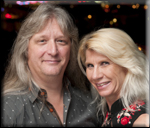Tripod+ Programs for Spanish-Speaking Families
Miami Science Museum
3280 South Miami Avenue
Miami, FL 33129
www.MiamiSci.org
COST: Free
Pre-registration for all Tripod + is required at www.miamisci.org/tripod.
With any questions, contact Tony Puig at 305-646-4286 or tpuig@miamisci.org.
Programs Made Possible By $150,000 Grant from MetLife Foundation
Through its Tripod + Program funded by a $150,000 grant from MetLife Foundation, Miami Science Museum is offering Tripod +, a series of 10 free, monthly hands-on science workshops for Spanish-speaking families. The programs, available to up to 30 people per session, are open to families with children in grades three through six. Pre-registration is required.
Tripod + addresses the need for science-rich learning opportunities for children and their families, in particular families whose access to these types of resources may otherwise be severely constrained. The overall goal of Tripod + is to provide out-of-school-time experiences and resources that will strengthen the role of parents and caregivers to support their children’s science learning.
All programs take place from 1-3 p.m. and lunch will be provided.
Oct. 6, 2012
All About Birds – Use your imagination to create your own bird with different types of beaks, bodies and legs.
What’s For Dinner? – Use models of a wide range of beaks to discover how the shape of the beak determines its function, and how the beak function determines the bird habitat.
Oct. 21, 2012
Hot Colors – Use different colors of felt to explore absorption and reflection of Sun’s radiant energy.
UV Detectives – Use ultraviolet light detecting beads to explore the effects of ultraviolet radiation.
Nov. 17, 2012
Name That Mineral! – Examine and observe physical properties of various minerals to identify their physical properties.
Pearly Whites – Learn to identify minerals in products they use at home and at school, and become aware of the importance of minerals.
Dec. 1, 2012
Cycle of Rocks in Multicolor – Model how sedimentary, metamorphic and igneous rocks are formed using colored pencils.
Saline crystals – Learn about minerals and the formation of crystals by observing the process of mineral growth.
Jan. 12, 2013
Dancing Salt – Investigate how sound waves can move objects and how to manipulate sound energy.
Toot Your Pipe – Build a musical instrument with pieces of pipe of different lengths, a glove, and a straw to investigate how vibrations are involved in making sound.
Feb. 9, 2013
A Penny For Your Drops – Explore physical properties of water, and how adding soap can change one of these properties. Investigate the consequences of adding pollutants to water in the environment.
A Chilly Situation – Explore how temperature affects the speed at which water molecules move.
March 23, 2013
Problem Solving Out Of The Bag – Investigate how to use simple building materials to make structures that can withstand a simulated earthquake.
Strawmendous – Investigate how to use simple building materials to make a skyscraper.
April 6, 2013
Watch Your Back – Explore the predator/prey relationship found in food chains.
Ecosystem On A String – Explore the interaction between living and non-living things by constructing a small-scale ecosystem.
May 11, 2013
Breath Of Fresh Air – Explore what kinds of large particles can be found in air.
Good Vibrations – Explore the properties of sound as it vibrates and passes through various types of matter.
June 8, 2013
Amazing Skydivers – Build and test a parachute to explore air resistance and force produced by the weight of an object.
Soaring Rockets – Explore the properties of air by building and launching a simple rocket.
Miami Science Museum aims to make a difference in people’s lives by inspiring them to appreciate the impact that science and technology can have on every facet of our world. For over 60 years, Miami Science Museum’s award-winning educational programs, family-focused exhibits, historic planetarium, and rehabilitative Wildlife Center and Clinic have enriched locals and tourists alike. In 2015, the legacy continues with the Patricia and Phillip Frost Museum of Science, a new world-class, state-of-the-art facility designed by Grimshaw Architects in the heart of downtown Miami. Miami Science Museum is accredited by the American Association of Museums and is an affiliate of the Smithsonian Institution. For more information about the current Museum or our future home, the Patricia and Phillip Frost Museum of Science, visit www.miamisci.org or call (305) 646-4200.

